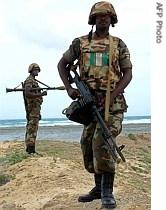The African Union's top
security official has presented Somalia's leaders a
four-point plan for creating stability in the war-ravaged
country. From the Somali capital, Mogadishu, VOA's Peter
Heinlein reports the plan's ultimate goal is to entice the
United Nations to take over peacekeeping duties from
beleaguered Ethiopian and African Union troops.
 |
| African Union soldiers in
Mogadishu, Somalia, 16 June 2007 |
During a four-hour visit to Mogadishu Wednesday, AU Peace
and Security Commissioner Said Djinnit said Somalia is
becoming Africa's biggest security challenge. He described
his stopover as a symbolic show of support for Prime
Minister Nur Hassan Hussein, just days after the prime
minister moved his government back to the embattled capital
from the more secure city of Baidoa.
But as if to underscore the continuing tensions,
suspected Islamic insurgents fired four mortar rounds within
a few hundred meters of Mogadishu's airport runway while
Djinnit's plane was on the ground. Several other rounds
landed just outside the prime minister's residence shortly
after Djinnit left.
The commissioner's visit also came days before an African
Union summit, at which the issue of Somalia's security will
be high on the agenda.
Djinnit said he outlined to Mr. Hussain a proposal to
initiate a road map that would be developed by Somali
leaders in partnership with the international community.
Its four components would include strengthening the
fractured nation's political process through reconciliation,
greater international involvement in peacekeeping
operations, creating a safe environment for humanitarian aid
deliveries, and building the capacity of federal government
institutions to face the immense challenges ahead.
The commissioner expressed frustration at what he called
the lack of international support for efforts to bring a
stable peace to Somalia. He told reporters his eventual
goal, and biggest concern, is persuading the U.N. Security
Council to re-establish the peacekeeping mission it
abandoned in the face of uncontrolled violence 13 years ago.
"It is the issue at the heart of our concerns," said Said
Djinnit. "We believe Somalia has been abandoned for so long
, and the Security Council remains the principal body in
charge of the maintenance of international peace and
security, and Somalia is becoming the biggest challenge for
security in Africa. And therefore the Security Council
cannot but assume its responsibility vis a vis Somalia."
Djinnit chided the Security Council for its recent
statement saying it was "reiterating its commitment to
considering the possibility of deploying" a Somalia
peacekeeping operation.
"If you look to ideal situation where peace is prevailing
before deploying a peacekeeping operation, you might not get
that ideal situation," he said. "So we are therefore calling
for flexibility on the part of the United Nations in
considering the situation in Somalia and in deciding as
early as possible on the deployment of the peacekeeping
operation to come and take over from the African Union."
The African Union peacekeeping mission in Somalia, known
as AMISOM, has an authorized strength of 8,000. But nearly a
year after it was formed, less than one-quarter of the
troops are in place. Officials say that is far too few to
stop the raging violence in and around Mogadishu.
A larger contingent of Ethiopian army troops is backing
Somali's military in its campaign against Islamic
insurgents. The presence of Ethiopian soldiers, however, has
become a rallying point for insurgents, fueling more
violence.
Ethiopia's prime Minister Meles Zenawi has repeatedly
said he wants those troops replaced by a strong
international force. But with Somalia among the world's most
violent and gun-infested countries, and the United Nations
balking at sending a peacekeeping mission, Prime Minister
Hussein told reporters it is premature to set a date when
Ethiopean troops could withdraw.
"To set a time maybe today it's not so easy, but you can
see the efforts of the African Union, you can see the
efforts of AMISOM [African Mission in Somalia] from time to
time increasing their troops, and this will definitely set a
way for us to discuss when and how the Ethiopian troops will
be reduced," said Hussein. "So what we will try to do is
have a very well-elaborated exit strategy."
Somalia's parliament chose Prime Minister Hussein last
November to replace his predecessor Ali Mohamed Gedi, who
was forced out in a dispute with President Abdullahi Yusuf.
A career public servant and former head of Somalia's Red
Crescent Society, Hussein is widely seen as a neutral figure
who might be able to bring unity to a country that has been
considered virtually ungovernable since 1991, when former
dictator Mohamed Siad Barre was ousted.
Source: VOA

